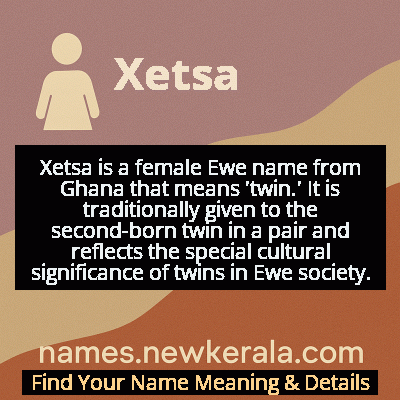Xetsa Name Meaning & Details
Origin, Popularity, Numerology Analysis & Name Meaning of Xetsa
Discover the origin, meaning, and cultural significance of the name XETSA. Delve into its historical roots and explore the lasting impact it has had on communities and traditions.
Name
Xetsa
Gender
Female
Origin
African
Lucky Number
6
Meaning of the Name - Xetsa
Xetsa is a female Ewe name from Ghana that means 'twin.' It is traditionally given to the second-born twin in a pair and reflects the special cultural significance of twins in Ewe society.
Xetsa - Complete Numerology Analysis
Your Numerology Number
Based on Pythagorean Numerology System
Ruling Planet
Venus
Positive Nature
Harmonious, responsible, caring, and artistic.
Negative Traits
Overly idealistic, superficial, possessive, or jealous.
Lucky Colours
Pink, turquoise.
Lucky Days
Friday.
Lucky Stones
Diamond, turquoise.
Harmony Numbers
2, 3, 9.
Best Suited Professions
Artists, musicians, teachers, healthcare workers.
What People Like About You
Warmth, nurturing nature, artistic flair.
Famous People Named Xetsa
Xetsa Adzima
Traditional Birth Attendant
Renowned for delivering over 500 sets of twins in Volta Region
Xetsa Agbenyega
Educator and Women's Rights Advocate
Founded the Twin Sisters Education Initiative in Ghana
Xetsa Amedume
Textile Artist
Internationally recognized for traditional Ewe kente cloth designs celebrating twin heritage
Xetsa Nyamuame
Cultural Preservationist
Documented and preserved Ewe twin naming traditions and rituals
Name Variations & International Equivalents
Click on blue names to explore their detailed meanings. Gray names with will be available soon.
Cultural & Historical Significance
This cultural reverence extends to naming practices, where twin names carry the weight of tradition, spiritual protection, and community recognition of the special bond between twins. The naming ceremony for twins differs from ordinary naming rituals, involving specific prayers, offerings, and community celebrations that acknowledge the twins' special status. In many Ewe communities, twins are believed to have their own language and spiritual guardians, and names like Xetsa serve as both identification and spiritual protection. The cultural significance of this name thus encompasses not just individual identity but also community values, spiritual beliefs, and the preservation of cultural heritage across generations.
Extended Personality Analysis
Women named Xetsa are often perceived as possessing complementary qualities that reflect their twin identity. They tend to be highly relational individuals with strong intuitive abilities, often described as having an almost psychic connection to others' emotions and needs. This emotional intelligence makes them excellent mediators and peacemakers in social situations. Xetsas are typically seen as balanced individuals who understand the importance of partnership and collaboration, reflecting the interdependent nature of twin relationships. They often exhibit a natural duality in their personality—able to be both independent and deeply connected, practical and intuitive, traditional and innovative.
This balance makes them adaptable to various situations while maintaining a strong sense of self. Their twin-associated identity often gives them a unique perspective on relationships and community, making them valuable members of any social group who understand the importance of connection while respecting individual boundaries. People with this name are frequently described as having a calming presence and the ability to see multiple perspectives simultaneously. They often excel in careers that require diplomacy, teaching, healing, or creative collaboration. The name Xetsa seems to carry expectations of emotional depth, relational intelligence, and the ability to navigate complex social dynamics with grace and understanding, qualities that are highly valued in both traditional and contemporary contexts.
Modern Usage & Popularity
In contemporary times, Xetsa continues to be used primarily within Ewe communities in Ghana, Togo, and the diaspora, though its usage has expanded slightly beyond traditional contexts. While not among the most common names in Ghana, it maintains steady usage among families who value cultural preservation and traditional naming practices. The name has seen a mild resurgence in recent years as part of broader movements toward reclaiming African cultural heritage and identity. Among the Ewe diaspora in Europe and North America, Xetsa serves as an important cultural marker and connection to ancestral traditions. Modern parents choosing this name often do so to honor family heritage and maintain cultural continuity, particularly in mixed-culture families where preserving specific ethnic identities becomes important. The name remains relatively rare outside Ewe communities, maintaining its cultural specificity and traditional significance while adapting to modern global contexts through increased visibility and cultural exchange.
Symbolic & Spiritual Meanings
Symbolically, Xetsa represents the concept of duality, balance, and complementary relationships in human experience. Beyond its literal meaning of 'twin,' the name embodies the philosophical understanding that existence often involves pairs and opposites that create wholeness—day and night, light and dark, giving and receiving. In many African philosophical traditions, twins symbolize the fundamental unity of apparent opposites and the idea that completeness often requires partnership. Xetsa also carries symbolic weight as a representation of spiritual connection and the invisible bonds that tie people together across time and space. The name suggests that individuals are never truly alone but are part of larger relational networks. Additionally, it symbolizes the idea of mirroring and reflection—the way we see ourselves in others and learn about ourselves through relationships. This makes Xetsa not just a name but a symbolic reminder of our interconnectedness and the importance of balance in all aspects of life, from personal relationships to broader cosmic principles.

